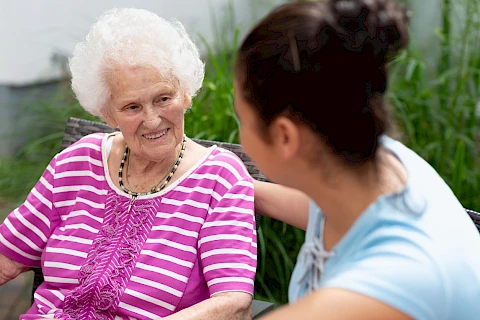
Alzheimer's disease not only impacts a person's memory but also the ability to communicate effectively. This can lead to frustrations and misunderstandings for both the person affected and their caregivers. An effective communication strategy becomes a cornerstone in the caregiving process. Caregivers should learn how to communicate better with seniors affected by Alzheimer's and understand their nonverbal cues. Discover how patience, clarity in language, nonverbal cues, and the right approach to challenging behaviors can enhance your communication with seniors managing this disease.
Alzheimer's Communication Challenges
With Alzheimer's disease, people often experience a gradual decrease in their ability to communicate. They can struggle to find the right words, get lost in conversation, or have difficulty understanding others. These issues arise due to changes in the brain caused by Alzheimer's, which impede the ability to process and relay information.
Patience and Empathy in Communication
Patience is paramount when communicating with someone with Alzheimer's. Allow the individual ample time to process what you're saying and form a response. This might mean waiting in silence for a few moments longer than you're used to. They may struggle to find the right words, repeat themselves, or become easily frustrated. Avoid rushing them or showing irritation. Instead, take slow, deep breaths and calmly rephrase or simplify your message.
Show empathy. Try to see things from their perspective. Imagine the confusion and disorientation they might be experiencing. Speak in a gentle, reassuring tone and validate their feelings.
Using Clear and Simple Language
When speaking with a person with Alzheimer's, clarity and simplicity are key. Use short, simple sentences and avoid complex vocabulary. Focus on one idea at a time, and allow ample time for them to process the information. For example, instead of saying, "It's time for your afternoon medication," you might say, "Here is your pill for now." Offering step-by-step instructions can also be helpful, particularly when assisting with tasks like dressing or meal prep.
Importance of Nonverbal Cues
Nonverbal cues play a significant part in communication, especially when verbal skills are declining. Body language, facial expressions, and tone of voice can convey a message more clearly than words alone. Maintain eye contact, use a calm and friendly tone, and express your words through supportive gestures. Be attentive to their nonverbal cues, too, as they can offer valuable clues about their feelings and needs.
Managing Challenging Behaviors
While communication breakdowns can occur, there are ways to manage challenging behaviors associated with Alzheimer's.
- Stay calm: Don't take their behavior personally. It's often a result of frustration or fear.
- Redirect attention: Gently distract them with a familiar activity or object.
- Minimize background noise: Turn off the TV or radio to reduce distractions and help them focus on the conversation.
- Maintain eye contact: Eye contact establishes a connection and shows you're paying attention.
- Offer positive reinforcement: Acknowledge and praise them for calm behavior.
- Validate and redirect anger: Acknowledge their frustration, then try to redirect them to a calming activity.
Remember, the goal is not to win an argument but to maintain a peaceful environment.
Maintaining a Positive Relationship
Despite the challenges, building and maintaining a positive relationship with your loved one remains crucial.
- Engage in activities they enjoy: Share simple activities like listening to music, looking at old photos, or taking a walk.
- Reminisce about happy memories: Encourage them to talk about their past but avoid dwelling on negative memories.
- Offer physical affection: A hug or holding hands can provide comfort and security. Of course, always respect their personal space.
- Maintain a sense of humor: Laughter can be a powerful tool for managing stress and connecting with your loved one.
Receive Alzheimer's Care From Senior Helpers Rock Hill
Mastering communication with a senior with Alzheimer's is a journey that requires patience, understanding, and a good dose of empathy. Each strategy plays a crucial role in maintaining a strong connection, from employing clear language to interpreting nonverbal cues.
If you're in Clover, Chester, Rock Hill, or York and need support in caring for a senior with Alzheimer's, consider Senior Helpers Rock Hill. Our team is trained to understand the unique needs of seniors with Alzheimer's, ensuring they receive the compassion, respect, and professional care they deserve. Let us be part of your support system as you navigate this challenging journey. Contact us today for more information.